Side Hustles
Make money online: How to make money online in the UK
We’re all looking for a way to make money online. After all, most of us are plugged into the internet for the majority of our waking hours anyway. Why not make some money while we’re at it, right?
Luckily, there are plenty of opportunities and advice out there. And whether you’re looking for full time work or a side hustle to sit alongside your main job, there are lots of options when it comes to ways to make money online. For example, freelancing is something you could either use as your main source of income or as a supplement. Other methods, like matched betting, can be slipped into your daily routine and are fantastic ways to add to your monthly wage.
This hub is home to some in-depth articles which look at the best ways to make money online in the UK. However, it’s important to remember that these aren’t get-rich-quick schemes. With the majority of methods we talk about in these guides, there’s some groundwork to be done. In some cases, you’ll need to put in a bit of time and effort before you’ll start to see make money. With others, you’ll be able to jump straight in but the amounts you earn may take a while to build up.
Whether you choose to make money online by filling out surveys, freelancing, selling goods, or on Instagram, you should bear in mind that you can earn up to £1,000 before you need to notify the taxman and register for self-assessment. However, any earnings you make from matched betting are tax-free, as these are legally classed as winnings under UK law. Check out Gov.uk or call HMRC for more information on how any money you make online is taxed.
Just click on one of the tiles above to read our full guides and find out everything you need to know about how to make money online:
7 unusual ways to make money
As much as we’d all like a bit of extra cash, sometimes it’s nice not to have to get serious about it. Whether you’re game for a laugh or just don’t want to hustle too hard – these are the money makers for you!
Connecting with advertisers can be easier if you join an affiliate network first (like Awin), but some brands have their own affiliate programmes, including OddsMonkey.
Starting a website is typically the best way to make money from affiliate marketing: if your visitors buy something after clicking an affiliate link to another site, you’ll earn a slice of the sale. Simple!
If you don’t fancy being a blogger, you can still get in on the action by sharing your links across social media.
- 2. Answer questions for cash
Hard to believe, but before smartphones were a thing, loads of folk used to pay £3-a-pop to text an answers service instead. What’s even more surprising is, some of those services still exist – and they pay researchers to respond to SMS questions on anything from “What time is the next bus?” to “Why doesn’t Gary like me?”. Best of all, you can work when and wherever you want, as it’s all done online.
Ask Any Question are “always on the lookout for researchers”. They pay around 25p per answer and, while that sounds tiny, if you’re fast (and accurate) it’s possible to build up a decent hourly rate.
- 3. Go on a game show
The game show route is a gamble – you could win big money and luxury goodies, but you might walk away with nothing more than “a lovely day out, thanks Bradley”. Alternatively, if you opt for a makeover show, you could still walk away with freebies or a fabulous new life: it’s worth a punt!
Start by listing your favourite shows, then check the channel’s website for auditions. To bump up your chances, go through all the channels and apply for everything you’d consider doing. Start with BBC, ITV and Channel 4.
If you want to cast your net wider, keep an eye out for ‘participants wanted’ ads in magazines or online.
- 4. Make money surfing the web
Making cash from everyday online tasks might sound too easy but, while it’s not a goldmine, it’s legit! Typically you sign-up (for free) with a ‘get paid to’ website, and earn points for searching for trending topics, visiting websites, completing surveys, watching videos or playing games.
Once you’ve earned enough points you can swap ‘em for cash or giftcards.
Accruing points – and rewards – can be slow going depending on the website. Keep an eye out for introductory sign-up offers, invite codes and bonus tasks to get there faster! Save the Student have a great list of ways to make money online.
- 5. Be a food tester
Finding work as a professional muncher often comes down a little bit of luck and a lot of scouring the web – but it can be done.
For the rest of us, the more likely route to scarfing down crisps for cash is through an opinions panel. Saros Research occasionally have taste tests up for grabs, while Campden BRI are just about the snacks. Either way, payment can vary from a couple of bucks to around £50 a session.
- 6. Get paid for testing websites
Sites like UserTesting record your mouse, clicks and voice as you visit specific websites, and pay for each visit you complete. Being chosen for gigs varies according to things like your age and location, so it’s not guaranteed work, but it’s an interesting way to earn spare change.
Payment varies, usually in the region of a fiver for each 15-20 min job. UserTesting pays out after just 7 days.
- 7. Rent out your stuff
Selling last year’s fashion disasters along with the rest of your clutter has always been a money-making staple – but the better win is to hang on to the good stuff and rent it out instead.
Buoyed by the Airbnb effect (which is just renting out your room, after all), now there’s Fat Lama for gadgets, garden gear and everything else you’ve got stuffed in the back of your cupboards.
Retail Arbitrage: What is It & How Does it Work?
If you’re looking to make some extra cash online, retail arbitrage could be the tactic for you. It’s relatively easy to do, and the profits can be very rewarding, especially if you’ve got an eye for a great bargain and are good are predicting trends. But just what is retail arbitrage, and how does it work?
In this guide, we’ll explore these questions and more, as well as telling you how you can get start making money through retail arbitrage. We’ll cover:
- What is retail arbitrage?
- How retail arbitrage works
- Is retail arbitrage legal?
- Is retail arbitrage dead? Does it still work?
- How to do online retail arbitrage
- Advantages and disadvantages of retail arbitrage
- Dropshipping vs retail arbitrage
- How to do online retail arbitrage on Amazon
- 5 tips for retail arbitrage success
What is retail arbitrage?
Retail arbitrage — sometimes called ‘arbing’ for short — is the buying and reselling of products for a profit. It’s different to traditional retail in that the buyer usually finds the items on sale in a store, bulk buys, and then sells them online at a price that falls between the amount they paid and the RRP. You then pocket the difference.
Retail arbitrage is nothing new, but if you’re picturing Del Boy and his market stall, things have changed drastically, thanks to the digital age.
The main difference between retail arbitrage and traditional retailing is that the items aren’t sourced from a wholesaler or manufacturer. Instead, they’re bought from other retailers, usually from a clearance stand.
How retail arbitrage works
Retail arbitrage a relatively simple concept. Most stores have a clearance section or choose to discount items sometimes. This is usually because the store is looking to get rid of some old stock. You see an item that was previously priced at £20, but is now down to £10. That’s a great saving on the original price. And you think the item will still sell well because it’s currently in trend in some way. Depending on the number available and the store’s policy, you can choose to buy as many of the products as you can. Then, you choose an online platform to list and resell the items on, for more than you paid, but less than the RRP.
The most popular platform to resell on is Amazon. We’ll look at exactly why that is later on in this piece, but one of the main draws is their in-house fulfilment service.
Is retail arbitrage legal?
Retail arbitrage as a concept is legal. It’s been around for years. Think of all those weekends you’ve spent traipsing around car boot sales or trawling through charity shops. If you’ve ever bought something and then flipped it, even on a small scale, that’s technically retail arbitrage.
However, there are some things that you should be aware of when sourcing products to resell.
Where you get the item from is important, in terms of the brand and the guidelines surrounding its sale. For example, if you go into retail stores and buy a six pack of Coca-Cola which says “not for individual resale” on the box, you shouldn’t split this and then resell the individual cans. Also, some brands only allow their products to be sold through authorised resellers, so you should check first and avoid these items.
On a small scale, it’s unlikely that you’ll face legal prosecution if you sell items like these, but it’s still a good idea to avoid them. Please be aware that you could be banned from some online selling platforms if you sell unauthorised items.
Is retail arbitrage dead (in 2020?)
Retail arbitrage is a popular way to make money online. Especially in the UK, where Google Trends indicate it has been a highly-searched term over the last five years. There’s no reason to believe that this will change any time soon. The tools, methods, and guidelines are perhaps becoming more sophisticated and tightening up, but there’s nothing to suggest that retail arbitrage is dead. Instead, trends suggest that there’s still money to be made.
Worldwide over the last 5 years:
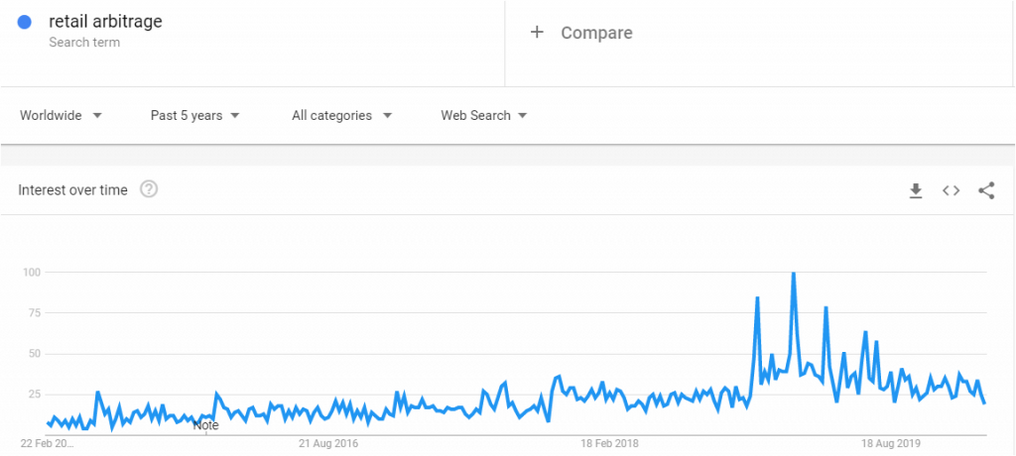
UK over the last 5 years:
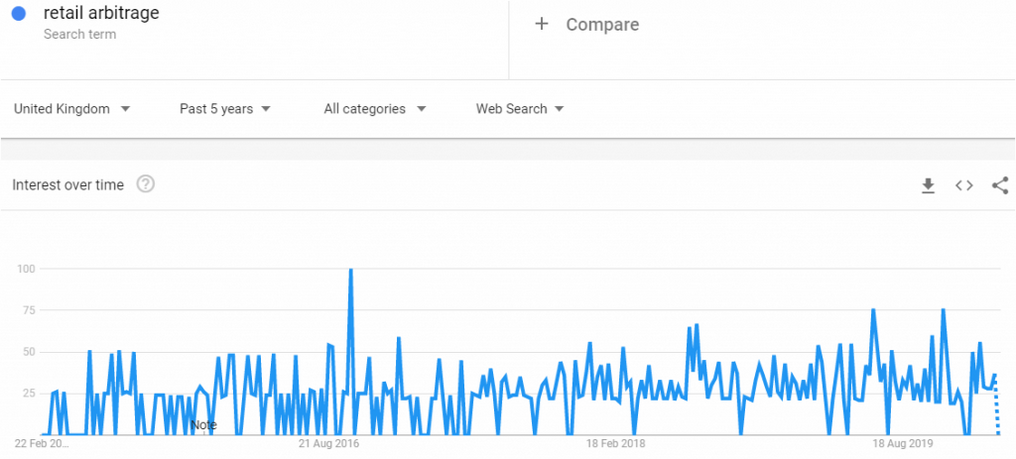
Retail arbitrage for beginners
Now, as with most money-making methods, this isn’t necessarily a get-rich-quick scheme or something to jump straight into without properly preparing beforehand. Let’s take a look at some of the advantages and disadvantages of retail arbitrage, using Amazon as your resale platform.
Advantages and disadvantages of retail arbitrage
Advantages
- Low overheads: With retail arbitrage, there are a few upfront costs, but they’re nothing in comparison to setting up a traditional online business. You’ll need to have enough money to buy the items you want to resell and if you choose to use Amazon’s fulfilment centre, you won’t need to pay to store numerous items until they’re sold. Instead, you can ship them directly to Amazon to take care of.Also, until you’re making a certain number of sales per month, you’ll get away with having a basic Amazon plan. An Individual Seller Plan offers a pay-as-you-go fee per order. However, if you go over 34 sales per month, it might make sense to upgrade to a Professional Seller Account.
- Gateway: Retail arbitrage is a great first step towards starting your own online business, if that’s something you’re interested in in the future. You can learn the tricks of the trade in terms of reselling and then move on to learn more about private labelling. We’ll look at private labelling in more detail in a bit but for now, it’s a more scalable business model than arbitrage allows.
- Learn valuable business skills: Obviously, retail arbitrage isn’t the only way to sell on Amazon. But it is a good way to learn how to get started. And you’ll learn some valuable online business skills along the way. For example, you’ll need to set up an Amazon Seller Account and you’ll soon learn how to find your way around the dashboard. If you choose to get Amazon to ship your items, you’ll learn all about their fulfilment centres and how to get the items to them so they can get them to the customer. As well as this, you’ll learn how to properly label and products and how to link your bank account to their seller account so that you can actually accept payments and make money!
Disadvantages
- Did you make the right decision?:
Even though you don’t have to pay out massive amounts in order to purchase items to resell, you do still run the risk of losing money if your inventory isn’t what people want. It pays to do your research into what’s currently selling well and what is old news. Just because something looks like a good deal when it’s sitting on those clearance shelves, doesn’t necessarily mean it is.Damage, defects or recall issues will greatly impact your chances of resale success. Also, if a new version of an item is due to be released, people may not be as interested in buying something that is now considered outdated. - Hidden costs:
If you find an item that sells well for you, you’ll probably want to stock up. This might involve visiting numerous stores in order to source more products. This could cost you more in petrol, time and effort than you originally budgeted for. - Access denied:
Remember, you have to be careful when choosing which items to sell. Some brands gate their products, which means that only authorised sellers can resell them. Sellers who already have a brand’s permission, can report unauthorised sellers to Amazon, which usually results in the reseller’s Amazon account being flagged and/or closed. It pays to stay away from gated brands. - Small time: While it’s a fantastic way to run a small-scale business, retail arbitrage isn’t easy to scaleup. For example, because you don’t have complete control over the products you’re selling, or are unlikely to have developed a brand of your own, it’s unlikely that you’ll have anything to sell on to someone else.
Dropshipping vs retail arbitrage
One technique which bears many similarities to retail arbitrage is dropshipping, where retailers sell and deliver goods to the end consumer using a supply chain, rather than direct retailer-to-customer shipping. However, there are a few key differences: with dropshipping, the seller never handles the goods they are selling, but instead sources them from a third party supplier. The goods are then packaged and sent straight onto the customer. The profits come from the margin between the wholesale and resale price.
There are pros and cons to both strategies, so the technique which will be most suitable — and lucrative — for you will depend on your personal circumstances. To learn more about this, take a look at our guide to making money online with dropshipping.
How do I sell on Amazon?
Now that we’ve looked at what retail arbitrage is and what you need to get started, it’s time to jump into exactly how to make money selling on Amazon.
Amazon is probably the most popular online platform used for people doing retail arbitrage. And because it’s been used for this purpose for a while, there’s loads of information out there on what you need to do. We’ll take a look at some of the platform-specifics you’ll need to start making money through Amazon.
- Open a seller account
The first thing you’ll need to do is set up an Amazon seller account. There are a couple of different levels of membership plans, such as ‘Individual’ and ‘Professional’. If you’re starting small, the individual seller account will probably be the right one to pick. - The Amazon seller app:
Once you’ve opened your Amazon account, the next step is to download their app specifically for sellers. This free app lets you see what items are currently being sold on Amazon, so you can do some research on the kind of thing you’d like to sell. - Amazon FBA
The letters ‘FBA’ stand for Fulfillment by Amazon, which is an order fulfilment service offered to anyone selling through the platform. FBA can handle your inventory, shipping, and returns, amongst other things. It was originally created so that Amazon could keep some control over their customer service and levels of satisfaction, even with other sellers involved. Amazon FBA offers a simpler way to fulfil orders for people who want to keep a relatively hands-off approach to selling (such as in retail arbitrage), and can be quite cost-effective. - Private labeling
This is the next stage up from retail arbitrage in terms of ‘having’ a business and selling on Amazon. There’s a higher up-front cost involved with private labelling but it gives you a much higher level of control over your products, business and brand. With this method, sellers buy directly from manufacturers and then market and sell them on a private label.Private labelling gives you more control over your pricing strategy and makes your business easier to scale if that’s something you want to do in the future. However, it isn’t without its downsides to. For example, the manufacturer you deal with may require you to place a minimum order quantity, which means that you’ll need to pay out a larger cost upfront than with retail arbitrage.
5 tips for retail arbitrage success
So if you’re interested in making money from retail arbitrage, here are a few helpful points to keep in mind while looking for the perfect items to buy:
- Be open-minded
Don’t go into the store looking for one thing and not open to considering buying anything else. You’re not your target audience. Just because you like something, doesn’t mean it will sell well. Conversely, if you think something is rubbish and won’t sell, you might be missing out on a fantastic profit-making opportunity. - Make contacts
If there are certain items that you’re after, don’t be afraid to ask a store’s employee when they’re due to go into clearance. Remember: shops want to sell their stock to you just as much as you want to buy it from them. It’s just about trying to get things on your terms, hitting the shop at the right time, and making sure you get the best deal. - Buy cheap
First thing’s first: know what you’re looking for and where to look for it in order to find the best price. Most stores have a clearance section, it’s just about finding the aisle or shelf. - Double check
Once you’ve hunted out some discounted items, it’s time to check the Amazon app to see what the difference in price is so that you can aim to make the biggest profits. - Condition
Make sure you check that the items are in good condition. There’s any number of reasons as to why things end up in the clearance section. Sometimes, the item or packaging is damaged. That could harm your chances of resale success, so make sure you look before you buy.It’s worth keeping the condition of the item in mind, especially if you’re planning to resell on Amazon. Products with damaged packaging are not classed as ‘new products’, so you won’t be able to sell them as such.
While it’s pretty simple as a concept, there’s still quite a bit that goes into retail arbitrage. Rather than thinking of it as starting your own business, it’s a great way to get to grips with a business model and the right tools for the job.
Success depends on things that are sometimes out of your control, like current trends and pricing options. Because of that, it’s possibly better to think of retail arbitrage as a side hustle rather than making it your main job. At least when you’re first starting out. It’s not an easy thing to scale up and is more suited to those who want to keep their business small.
Now you know how to do online retail arbitrage, you’re ready to get out there and start scouting for products that you think will net you a tidy profit online.
If you’re interested in starting a side hustle to earn some extra cash, then you might want to take a look at our selection of guides on how to make money online. Here at OddsMonkey, we have loads of tips and tricks you can use to generate an additional income, including guides to dropshipping, making money on Instragram, freelancing, and completing online surveys. You could also try your hand at matched betting, where you can use the promotional free bets offered by bookmakers to make money — to learn more about how this works, read our matched betting guide.
Jailbreak Firestick Instructions
Below, you will find both a video tutorial and screenshot guide that will show you how to jailbreak a Firestick.
I suggest watching the video tutorial first because I go through important details that you won’t find within the screenshot guide.
Video Tutorial
Free CobbwebmediA Supercharge Firestick Guide

Screenshot Guide
The following screenshot tutorial will take you through the simple steps necessary of how to jailbreak Firestick.
The first thing we will do is setup a new app store called Aptoide TV.
Step 1 – Go to the home screen of your Firestick by clicking the home button on remote
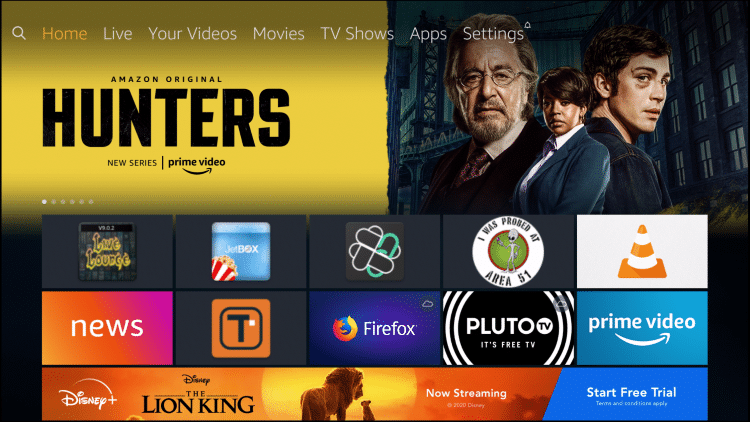
Step 2 – Hover over the Settings menu item
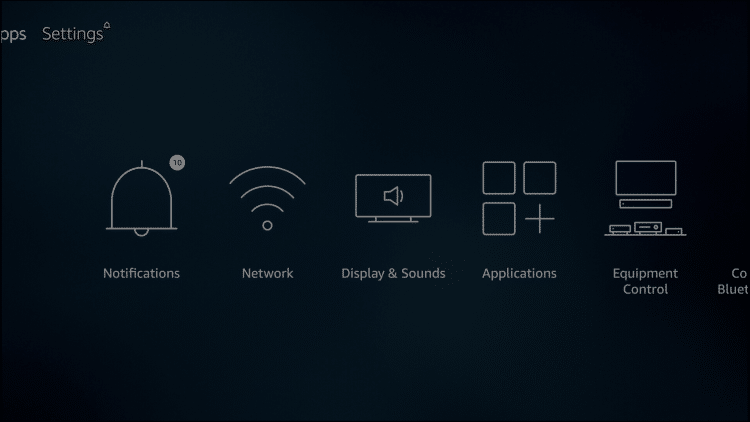
Step 3 – Click Preferences

Step 4 – Click Privacy Settings – you may not see any of these options on older Fire TV devices or systems that haven’t been updated, if so proceed to How to Install Alternative App Store below.
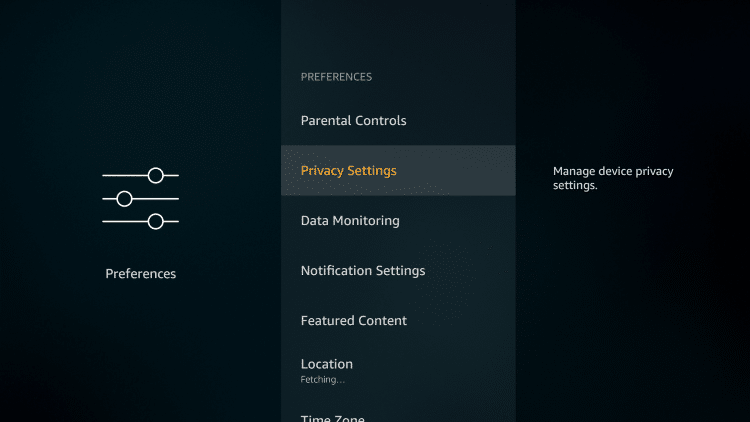
Step 5 – Turn these Privacy Settings to OFF
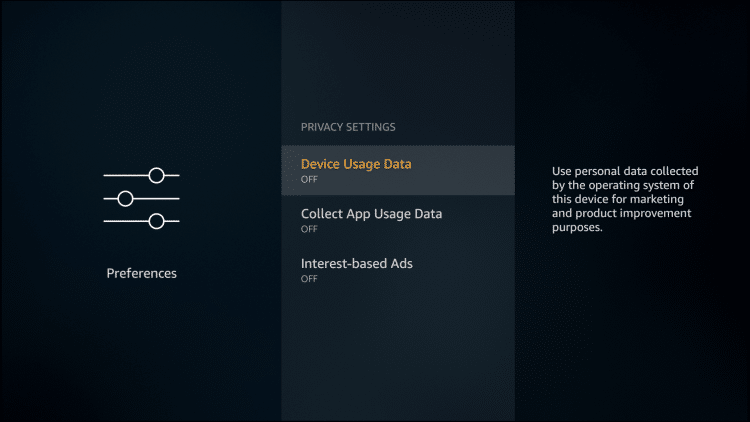
Go back to previous screen by clicking back button on remote after changing these settings to “Off”.
Step 6 – Click Data Monitoring
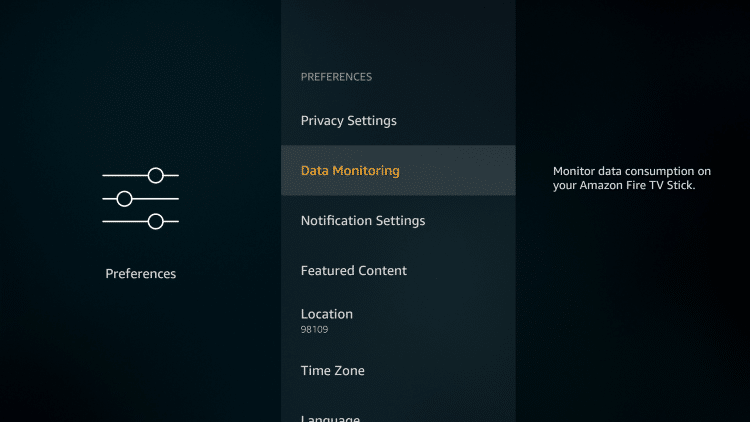
Step 7 – Turn off Data Monitoring

Step 8 – Return to Preferences and select Featured Content
Step 9 – Turn these Off
Step 10 – Click back button, return to the previous screen and click the My Fire TV

Step 11 – Click Developer Options

Step 12 – Click Apps from Unknown Sources
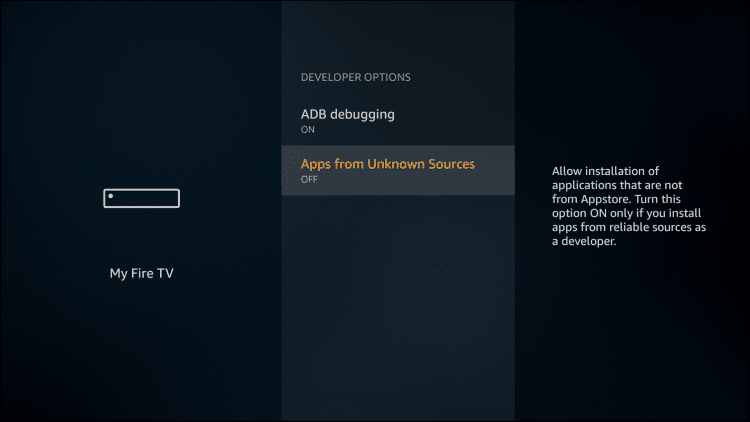
Step 13 – Click Turn On button
We have now jailbroken our Firestick by allowing for the installation of applications that aren’t available within the Amazon App Store.
Most guides stop after this but I will take it a step further and show you how to install DOWNLOADER
I will also provide suggestions on which applications that you should install onto your jailbroken Fire TV Stick so you can enjoy free movies, TV shows, live channels, sports, and much more.
Follow the steps below to install Downloader & Alternative App Store on your Firestick/Fire TV.
1. Launch the home screen and hover over the Search icon
2. Type in Downloader and click “Downloader” which will appear under keyboard
3. Select the Downloader app
4. Click Download
5. Click Open
People